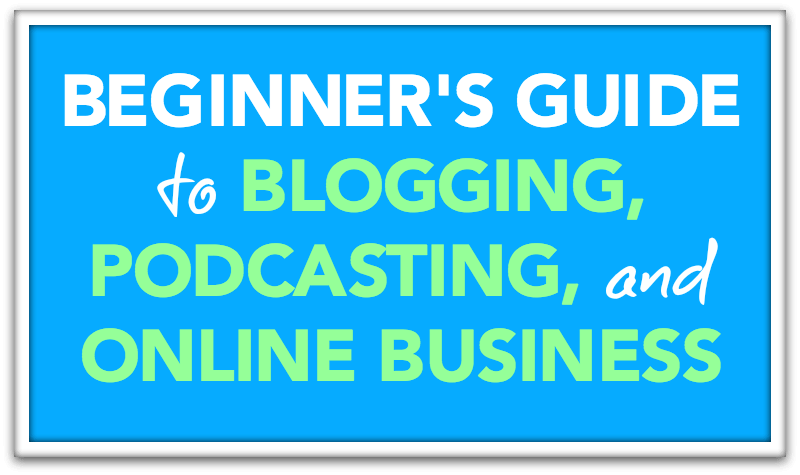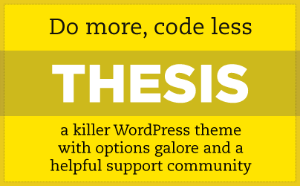Beginner’s Guide to Blogging, Podcasting,
and Online Business
Welcome to my beginner’s guide page for getting started online!
Whether you want to start a website, write your first blog post, record your first podcast episode, or sell your first product, this is the best place to lay the foundation for all of those amazing online goals.

Photo Credit: Jeff Sanders
Before we dive in, be sure you visit my Toolbox page to see the complete list of resources that I recommend.
My Toolbox is kept up-to-date with all of my latest recommendations and it includes the tools I am currently using to run my website, write my blog posts, record my podcast episodes, produce my videos, and develop my products.
Now, let’s get started!
First Steps
Before you produce anything online you will need a few key tools that will lay the groundwork for all of your future endeavors.
#1: Choose a Hosting Service
A host is the the company that will use their servers to store and deliver your website to the world.
It’s incredibly important to choose a good host because your host will determine the speed, security, and availability of your site, among many other features.
I recommend SiteGround. They offer very affordable packages for beginners and you can easily upgrade when your website becomes incredibly popular.
Their customer service is top notch, which is unbelievably important because you will definitely need help as you begin to develop your online presence.
SiteGround is a very popular service, and if nothing else, the price and customer service should be enough to convince you to jump on board.
But, there are a few more great reasons to choose SiteGround.
- Speed: The entry-level packages offer incredibly fast websites. When people visit your site, they will expect it to be fast. If it’s not, they will leave. Fortunately, you get great speed with all of SiteGround’s packages.
- Easy of Use: If you’re anything like me, you don’t know squat about technology, so you’re thrilled when you realize that setting up a website can be super simple. SiteGround is setup to be easy for beginners like you and me.
- Compatibility with WordPress: As I explain below, WordPress is the best platform for you website, blog, podcast, and online business. But, WordPress can be tricky to setup without help. SiteGround steps in and makes installation and setup wonderfully pain-free.
#2: Choose a Platform
A platform is the framework that houses and develops your website. Think of it like the steel bars of a skyscraper, except that you can bend, mold, and customize the steel bars as you wish.
Some of the most popular platforms include WordPress, Blogger, and Tumblr. All of these options offer free domains and blogging tools, and are great for beginners.
 WordPress is the ideal platform to develop your website. I know, that’s a strong biased opinion, so let’s break down what sets WordPress apart from the rest.
WordPress is the ideal platform to develop your website. I know, that’s a strong biased opinion, so let’s break down what sets WordPress apart from the rest.
- It’s Free! You can’t beat the price. WordPress.com and WordPress.org are both free. FYI, WordPress.com is best for total newbies and hobby bloggers, while WordPress.org is perfect if you want to build a more professional or business-related site.
- Highly Customizable This is where WordPress shines brightest. Pretty much whatever you want to do can be done on WordPress: blogging, podcasting, selling products, fancy sites, simple sites, and everything in between.
- Incredible Online Community of Developers and Bloggers: If you get stuck, there’s about a million other bloggers who have had your same problem and have already found a solution. All you have to do is Google it. I have solved nearly every problem with a simple search.
I use WordPress to run this site and I couldn’t recommend it highly enough.
#3: Choose a Theme
A theme is the look and feel of your website. To keep the analogy going, if the platform represents the steel framework, the theme is the designer who decides how everything will look.
The cool thing is that every theme can be customized, how much though depends on which theme you choose and how skilled you are at things like HTML, CSS, and other fancy acronyms.
For beginners I recommend you start with the default theme in WordPress just so you can learn the ropes. When you begin to dive into the world of themes it can get pretty confusing pretty fast.
 For more advanced users, or those wanting to go pro right off the bat, I recommend Thesis. I have been using Thesis to run this site since day one and it’s remarkable due to it’s potential.
For more advanced users, or those wanting to go pro right off the bat, I recommend Thesis. I have been using Thesis to run this site since day one and it’s remarkable due to it’s potential.
You can customize Thesis in just about anyway you can imagine. You also don’t have to fully understand HTML or CSS, but it helps.
Blogging
Blogging is a fantastic tool for sharing your thoughts and content with the world, whether you do it just for fun or for serious business. Here’s how to begin your blogging journey.
#1: Choose an Overarching Topic and Specific Niche Categories
The best blogs have a main theme, or overarching topic, that guides the content. For example, the overarching theme for my site is personal development. Within that larger topic I also have more specific niche categories, including productivity, early mornings, healthy habits, and health & fitness.

Choosing a main topic may be challenging at first, but simply consider your blogging goals. If you are writing just for fun or a hobby, then sticking to a theme is less important.
However, if you are blogging with a specific outcome in mind, like selling products or services, then sticking to your theme is critically important.
I will say that in the beginning it’s actually helpful to write about a wide variety of topics before you scale down and focus. I have been writing about many topics for years and I’m still finding ways to narrow my content.
#2: Forget About Fame, Fortune, and Success (For Now)
Refrain from spending time on design, marketing, or getting popular right off the bat. It’s tempting, I know. But, the best way to improve is the write and write a lot.
Quantity is your best friend. I love the idea of writing well-constructed articles on a beautiful site and then attracting millions of readers. The reality is that this scenario is possible in the long run, but highly unlikely now.
Today, your best bet is to get better at writing. Focus on creating lots of content and improving your skills as a writer and communicator. You’ll have plenty of time to tweak your site’s design and becoming wildly famous later.
#3: Commit to Publishing Once a Week
Though I encourage you to write a lot and save your writing, it’s best to publish once a week. The reason is that many new bloggers have a lot of momentum early on and think they can write 5 new articles a week.
This lasts for about 2 weeks and then they never write anything ever again.
Consistency is your best friend. Your audience will appreciate it and you will have an official writing schedule.
Sure, you can choose to publish more than once a week, but if you start to miss publishing deadlines it’s going to hurt. Start strong and stay consistent.
Podcasting
If you don’t know it already, I LOVE podcasting. In fact, it’s the best part of my brand here at JeffSanders.com. Most of my traffic comes from podcast listeners and most of my best content appears on my show, not on my blog.
If you’re considering starting your own podcast, I’m already excited for you!
For a complete breakdown of my podcasting launch process, check out my article, Podcasting 101.
#1: Raise the Bar Right Away
If there is only lesson on podcasting that you learn from me, let it be this: commit to quality on day one.

I can’t tell you how many thousands of terrible podcasts exist. Check out Apple Podcasts and see for yourself. There are more horrible shows than good ones . . . a lot more.
The great news here is that there is a wonderful opportunity to set yourself apart by committing to raising the bar right away. I decided to launch a podcast and then didn’t do so for almost a year because I wanted to be ready first.
That strategy worked. Within 2 months of launching I was seeing more than 1,000 downloads a day.
Commit to impeccable audio quality, well-planned shows, and beautiful album artwork. Anything and everything associated with your show should be just plain awesome.
#2: Plan, Plan, and Plan Some More
Unless your podcast is really just a hobby and you only plan to share your audio with your grandparents, then planning is going to be more important than anything.
I script all of my episodes, write detailed show notes, and schedule my episodes months in advance. This is how I began the show years ago and I how I operate today.
Planning is the one key element that creates high-quality shows and your audience can tell. If you are a superstar radio DJ, than maybe you have the skills to plan a little less because you are so good on the mic.
For the rest of us, planning is something we can control and it makes a phenomenal difference in the end result.
#3: Publish Episode One Before You’re Ready
Unless you’re an experienced radio DJ, podcasting won’t be natural and you won’t like how you sound. Publish anyway.
Though I planned the launch of my podcast for months, I hurriedly produced the first episode and just published it. Though I didn’t feel ready I realized that I would NEVER feel ready.
You’re not going to feel ready either. Just get an episode recorded and get it out the door. You can improve with your future episodes, and YOU WILL.
The one guarantee is that if you don’t release the first episode, it’s going to be really hard to release any at all.
Online Business
If you are starting your own website, blog, and/or podcast with the intention of building an online business, FANTASTIC!
Online business can be one of the most lucrative and fun endeavors you ever embark on. Let’s get you started so you can begin selling stuff right away!
#1: Setup a PayPal Account
PayPal is the ideal option for accepting payments online. If you want to sell products or services on your website, you will definitely need a PayPal account.
 When you have a PayPal account setup, your customers can either pay you with their own PayPal accounts or use their Credit cards through the PayPal system.
When you have a PayPal account setup, your customers can either pay you with their own PayPal accounts or use their Credit cards through the PayPal system.
I waited years before I started selling products with the option of using Credit Cards through a merchant account, outside of PayPal. I waited because giving customers the option of using their VISA, MasterCard, Discover, or Amex costs you real money every month.
PayPal doesn’t charge any monthly fees, only fees per transaction. So, if you only sell one product, you only pay the fees on that one sale. If you offer Credit Cards and only sell one product, you will continue to pay monthly fees.
To keep things simple in the beginning, setup a PayPal account and only upgrade to Credit Cards through a merchant account when business is booming.
#2: Solve an Obvious Problem
Any Business 101 class will hit this nail right on the head: sell what you customers are willing to pay for, not what you are willing to offer to them.
In other words, if you solve an obvious problem that you customer has, and your customer agrees with you, then the likelihood of a sale increases dramatically.
On the other hand, if you think of a “genius” new idea, spend many hours creating it, and then make it available for sale WITHOUT confirming your customer actually wants it, you may end up broke and frustrated.
The simplest way to begin this process is by learning about your customer.
- Be a customer in your niche yourself.
- Survey your audience to know what frustrates and motivates them more than anything.
- Study other successful products in your niche and find out WHY they are selling well.
My first product was a 220-page self-published book. Guess how many I have sold years later? 20 copies. That’s right, I didn’t study the market BEFORE I wrote the book.
Don’t do that.
#3: Choose One Small Product to Get Your Feet Wet
There are many elements of selling online products, so start tiny. The last thing you want to do is invest hundreds or thousands of hours into a product only then to discover it won’t sell well.
To keep your momentum going and to make the time available to learn all there is to know about online sales, don’t spend too much time creating the product itself.
In fact, I would recommend you create many small test products just to figure out how you want to sell anything online and test your market at the same time.
Everything online revolves around testing, tweaking, and updating constantly. In order to stay nimble you have to stay small.
Final Steps
Congratulations on making the decision to get started online! I know it can seem like a lot to tackle, so it’s great to just jump in and start.
Here’s a few pointers to keep your focus as you begin to build your new online empire.
#1: Commit to One Major Project at a Time
Trying to do more than one thing at a time will backfire. It’s a guarantee.
I recommend choosing just one project at first, mastering it, and then moving on to the next. For example, that could mean blogging before podcasting or podcasting before selling products.
The order is less important. What does matter is that you stay focused and commit to excellence from the very beginning.
#2: Pace Yourself for the Long Game
If you truly want to succeed online, then committing to a long-term plan is the most sure-fire path to success. It’s not a sexy answer, but it’s the truth.
Persistence wins. There are so many people looking for quick cash and overnight success that the ones who are willing to continue to fight year after year are the ones who ultimately bring home the biggest rewards.
I have been working online in various capacities since 2008 and every year brought new challenges that upped my game. From blogging to podcasting, online product sales to virtual coaching, everything has its place and it’s all worth it.
#3: Find Joy in the Process and Let Outcomes Fall as They May
I want to leave you with a final note that may matter more than anything else I have said here. Results are fickle. People are weird. Technology is constantly changing and keeping pace can feel like a roller coaster of insanity.
What doesn’t have to change is your desire to fall in love with the creative process. Everything you create online is a work of art. Videos, audio files, written articles, products and services — all of it is beautiful in its own regard.
I challenge you to fall in love with the process and appreciate your own efforts. Getting stuck on waiting for success can be a long journey and you will find so much more joy, fulfillment, and satisfaction in your own internal growth than from any external reward.
Good luck to you and let me know if there’s anything I can do to help!








